Flaccid flowers of the “Polish Spring”
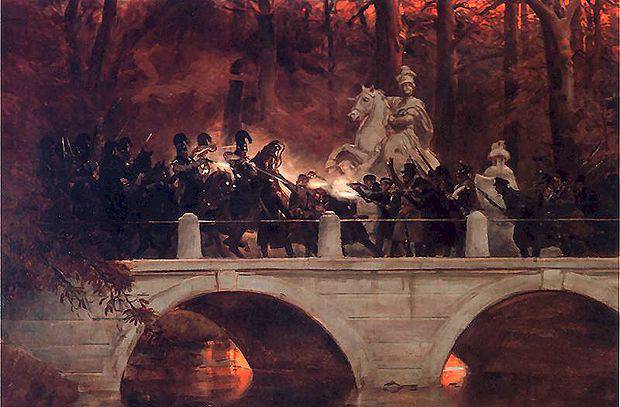
The Polish uprising of 1830 rejected both Poland and Russia in the past.
Thanks to the decision of the Congress of Vienna on the map of Europe, Poland reappeared - the so-called Kingdom of Poland, which had the status of a kingdom that was in personal union with the Russian Empire. The Russian emperor Alexander I, who was a fiery supporter of the independence of the Polish state, granted him a liberal constitution: Poland was ruled by a Sejm, assembled every two years, and by a “king” —that is, the Russian emperor, who was represented by the governor. The first governor was the former divisional general of the Napoleonic army, Prince Jozef Zayonchek, whom the Poles considered a “traitor” for sympathy for Russia, and the Grand Duke Constantine was appointed commander-in-chief of the Polish army.
However, the elite, who did not experience Russia's loyalty, entered the army of the kingdom, which he was entrusted with leading from the very beginning. The fact is that it was staffed mainly from veterans of the Polish legions, who had recently fought for Napoleon and, of course, did not share Zayoncek’s views that Russia is the most reliable guarantee of Poland’s independence. The Polish gentry dreamed of restoring their homeland to the borders of the 1772 year - that is, before the first partition of Poland. But after all, within these borders, it included Lithuania, a piece of Belarus and the western part of Ukraine — the so-called eight voivodships that were part of the lands of the Russian Empire. That Poland, which the nobles with contempt called "congress", corresponded only to the former borders of Napoleon's "Duchy of Warsaw".
Emperor Alexander, who had a great sympathy for the Polish national movement, over time began to give the Poles more and more reasons for discontent. In 1819, preliminary censorship was introduced in the Kingdom of Poland. And after the Sejm rejected the imperial bill, which abolished jury trials (which were previously introduced by Napoleon), the king lost interest in the activities of the Polish parliament. When the third Diet was elected in 1822, its convocation was postponed for three years. The king did not want to see in the Sejm clear opposition: when one of the voivodships elected Vincent Nemoevsky, a well-known critic of the Russian authorities, he was re-elected there; Nemoevsky was elected again, and in punishment for this province the right to elect deputies was denied, and Nemoevsky himself was arrested. Fearing opposition sentiments in the Sejm, Alexander canceled the publicity of the meetings of the Polish parliament and turned him into an obedient executor of his will. Nobility outraged and caused the appointment of the new governor - after the death Zayonchek - Grand Duke Constantine, despite the fact that the latter sincerely loved Poland.
Vysotsky: thanks for being alive
The desire for independence forced the radical part of the officers to move to decisive actions. In 1819, several Polish officers created the National Masonic Society of about 200 people, which a year later was transformed into the Patriotic Society - a secret organization that had support in both noble and church (Catholic) circles. The patriotic society was not the only organization of Polish nationalists: the Kingdom of Poland abroad, on the lands of the Russian Empire itself, where the Poles lived (in Vilna and Volyn), a number of secret organizations appeared.
It is curious that the Patriotic Society tried to establish contacts with the Decembrists, but did not find any points of contact with them. As a result, even the investigation into the case of the Decembrists, in which hundreds of people who were barely involved in their conspiracy were arrested, did not find any connection between the rebels and the Polish secret societies.
The determination to openly oppose Russia appeared in the Patriotic Society after Russia entered the war with Turkey in 1828 - the conspirators hoped that the tsarist government could not quickly transfer the army in the Balkans to quell the uprising. One of the leaders of the society - Peter Vysotsky - arranged with other secret organizations to kill Emperor Nicholas during the coronation ceremony of his Polish crown, scheduled for March 1829 of the year. However, the plan could not be implemented: Emperor Nicholas was successfully crowned and became the Polish king.
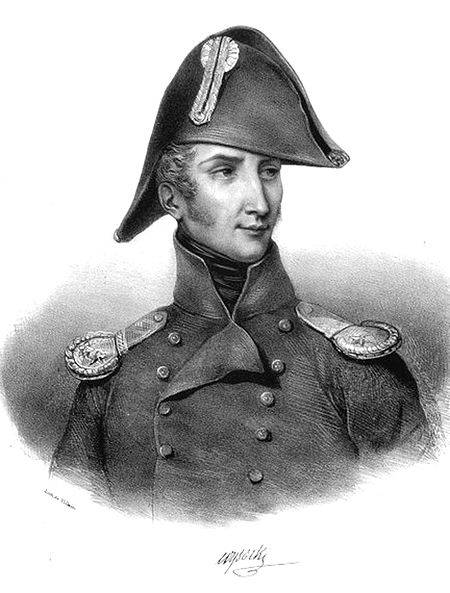
New inspiration engulfed conspirators in August 1830, when they came news about the successes of the July revolution in France. A meeting was hastily convened, before which the question of an immediate uprising was raised. However, the majority of the conspirators spoke out against such haste: it was obvious that the efforts of a single officer could hardly bring up soldiers to fight - this plan was too similar to the one that the Decembrists had already tried unsuccessfully. It was decided to start the performance after the generals of the army could be involved in it. This turned out to be quite a real task: having inclined several generals to its side, the conspirators finally began preparations for an uprising. They saw the support of the people - separatist sentiments have long been embraced not only by the gentry, but also by the intelligentsia and even a significant part of ordinary citizens. Away from him was only the peasantry.
Salvation of the Tsarevich
According to Vysotsky’s plan, the uprising was to begin on the evening of November 29 with simultaneous arson attacks in the northern and southern parts of Warsaw. It was a signal: with the glow of fires, two events were planned at the same time - Polish students led by Ludwig Nabelyak were supposed to enter the Belvedere Palace and kill Tsarevich Constantine, and Vysotsky himself, with a detachment of troops, was to seize the Russian barracks and disarm the Russians. The death of the Grand Duke was necessary to decapitate that part of the military that retained loyalty to the Russians. Vysotsky conceded the killing of Constantine to students for noble reasons: it is not fitting for a soldier to shed the blood of his commander. It is curious that, like many nationalists of the early XIX century, Nabelyak was a folklorist and researcher stories his country: the historian could not wait to make history. After the capture of the arsenal, the conspirators were going to distribute weapon to the people.
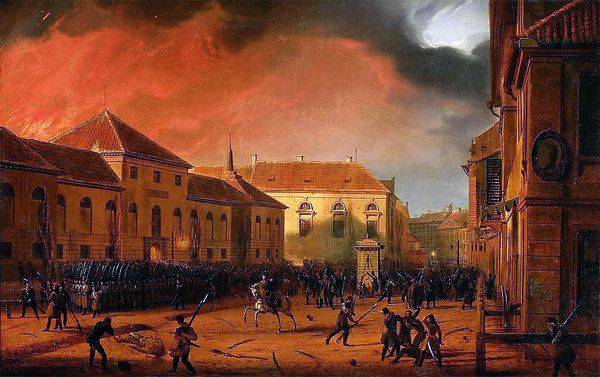
The plan was simple and effective — the conspirators could count on 10 support for thousands of soldiers against approximately 7 thousands of Russians, many of whom were also natives of former Polish regions. However, from the very beginning everything went wrong. The first arson occurred half an hour earlier than necessary, the second was not carried out at all. Nevertheless, Vysotsky and Nabelyak performed according to plan. Petr Vysotsky raised the under-words with the words: “Brothers, the hour of freedom has struck!” - and over 150 the conspirators attacked the barracks of the guards uhlans. The 18 students moved to Belvedere. Part of the rebels had to go to the palace from the facade, the other - to guard the rear in case "a bird would fly into the garden." They were joined by Valentin Vitkovsky, a former valet who served in the palace and knew the building well.
A peaceful dream of unsuspecting Constantine was disturbed by a crash on the first floor: breaking the windows in the entrance hall and the chandelier (I’d like to add - "and igniting car tires," but this will of course be an anachronism), the conspirators rushed up the stairs to the office of the Great the prince. Constantine was warned by the head of the Warsaw police in the palace, Lyubovitsky, who only had time to shout in Polish: “Bad, Your Highness!”, But the conspirators struck him with a bayonet. Constantine, outraged by the invasion, was going to leave the room directly to meet the rebels - and would probably have been killed if it were not for the determination of his valet Frize, who roughly pushed the Grand Duke away from the door and locked it from the inside.
The rebels tried in vain with their legs and butts to break down the oak, wrought iron door. The valet brought the Grand Duke out of the room through a secret passage, hiding in the attic. He was finally saved by a happy accident (happy, though, only for Constantine himself): the conspirators who were in charge of the garden grabbed General Alexey Gendre, who was trying to escape from the palace, - he was mistaken for a cesarevich by mistake. Zakolov his blows of bayonets, joyful rebels shouted: "The Grand Duke is killed!" - And their comrades hurried to leave the Belvedere Palace.
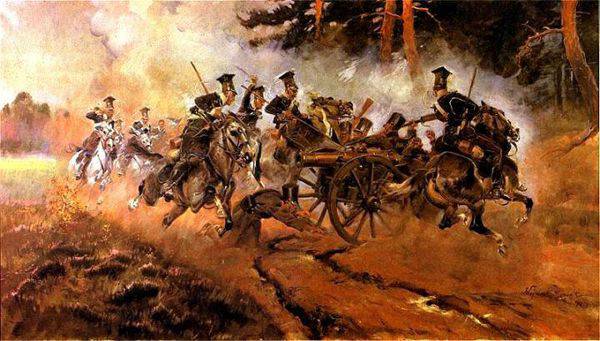
The triumph of the rebels
The attack of Vysotsky and his colleagues on the Russian army barracks was more successful: in spite of the fact that their first attack was repulsed, a two-thousand crowd of students and workers who joined them burst into the barracks. The crowd tore up the six generals who remained loyal to the Tsarevich (one of those generals who participated in the uprising was killed by mistake). Weapons from the captured arsenal were distributed among the people. The demoralized Russian regiments left Warsaw, which was at the mercy of the rebels. The crowd robbed the shops and houses of Russians. “Ahead, the priest rode with a bare saber in his hand and excited the people to revolt; several drunken, fair-haired women walked, embracing with soldiers and rabble, in the midst of the crowd. All this sang, screamed; several close shots were heard — the whole house was trembling at the sound of a knock and a stamp; in the sky one could see the glow from fires in two places; the sound of the alarm went off in the distance, ”writes one of the witnesses of this terrible night.
Constantine turned out to be more resolute, the uprising could be suppressed in a few hours. The commander of the artillery of the Guards Corps, Daniel Gershteintsveig, proposed to the Cesarevich to take the city with a quick attack, disperse the crowd, and force the insurgent troops to submission. However, the Grand Duke did not want bloodshed - in the future, he often showed his sympathy for the Poles, believing that what happened was a consequence of their personal dislike of Emperor Nicholas. In addition, he was partly deceived by indecision or the ostentatious loyalty of the Polish leadership: thus, the Governing Body issued a proclamation that deplored what had happened and called for the rebels to obey. The Grand Duke probably sincerely believed that the riots would soon subside.
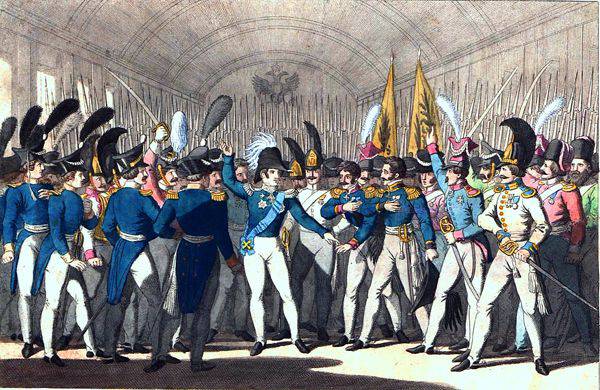
However, he was wrong. Soon after the Russian troops left Warsaw, a rebellion swept the whole country. Despite the fact that the crown prince could not be killed, the rebels believed that they had won: Warsaw was cleared of Russian troops. The rebels created the Provisional Government, which became the bearer of power. The council was headed by Prince Adam Czartoryski - a former friend of Alexander I, a member of the Secret Committee, and now the head of the separatists. 25 January 1831, the Polish Sejm proclaimed the independence of the Polish state.
Autumn empire
The “Polish Spring” lasted for about a year - this duration was largely due to the fact that the uprising was a surprise for the Russian government and the transfer of army units took time. However, after Nicholas I sent thousands of people to 120 Poland under the command of Field Marshal Dibich, his fate was decided. The conspirators could put under the gun only half the people. And in vain, Konstantin asked Nicholas of mercy for the rebels: “Mercy for them, dear and incomparable brother, and condescension for all is the prayer of a brother who had the misfortune of obedience to devote the best part of his life to the formation of troops, unfortunately, who turned their weapons against their home country. " Nicholas, however, really issued a proclamation, where he promised to forgive the rebels if they submitted, released the Russian prisoners, returned the weapons and restored the Administrative Council. The Poles responded with ridicule, and then the tsarist troops began fighting. In September 1831, the royal army stormed Warsaw. Thousands of rebels were sent into exile.
Nicholas punished the Poles, depriving them of the hope of giving independence - the constitution was abolished, the Kingdom of Poland was declared an integral part of the Russian Empire, and the Polish crown - the hereditary crown of Russian emperors. The Sejm was liquidated, the main governing body of Poland became the Administrative Council, which was governed by the governor of the emperor.
The “Polish Spring” adversely affected the internal life of Russia itself: fearing new insurrections, Nikolai accepted a conservative general line — the question of the abolition of serfdom was removed from the agenda, censorship was tightened. In the ruling circles even discussed the issue of closing universities, which the king considered (and not without reason) breeding grounds for revolutionary sentiment. And even despite the fact that the universities were not closed as a result, education was dealt a heavy blow: the government sharply reduced the number of departments and students. By the end of the reign of Nicholas in Russia, there were only 50 students in 2900 million, that is, approximately as many as studied, for example, at the University of Leipzig.
Historian Granovsky wrote about the deplorable results of this policy: “Our situation is becoming unbearable day by day. Every movement in the West responds to us with a shy measure. Denunciations are in the thousands. About me for three months collected information twice. But what does personal danger mean in comparison with general suffering and oppression! The universities were supposed to be closed, now they limited themselves to the following measures already carried out: they raised the fees from students and limited their number to the law, by virtue of which there can be no more than three hundred students at the university. In the Moscow 1400 man of students, therefore, it is necessary to release 1200 in order to have the right to accept hundreds of new ones. The nobility institute is closed, many schools face the same fate, for example, the lyceum. For the cadet corps compiled new programs. Jesuits would envy the military teacher, the originator of this program. There is something crazy to go. Benefit Belinsky, who died on time. Many decent people have fallen into despair and look at what is happening with stupid calm. ” So the unfortunate Polish uprising struck Russia itself.
Information